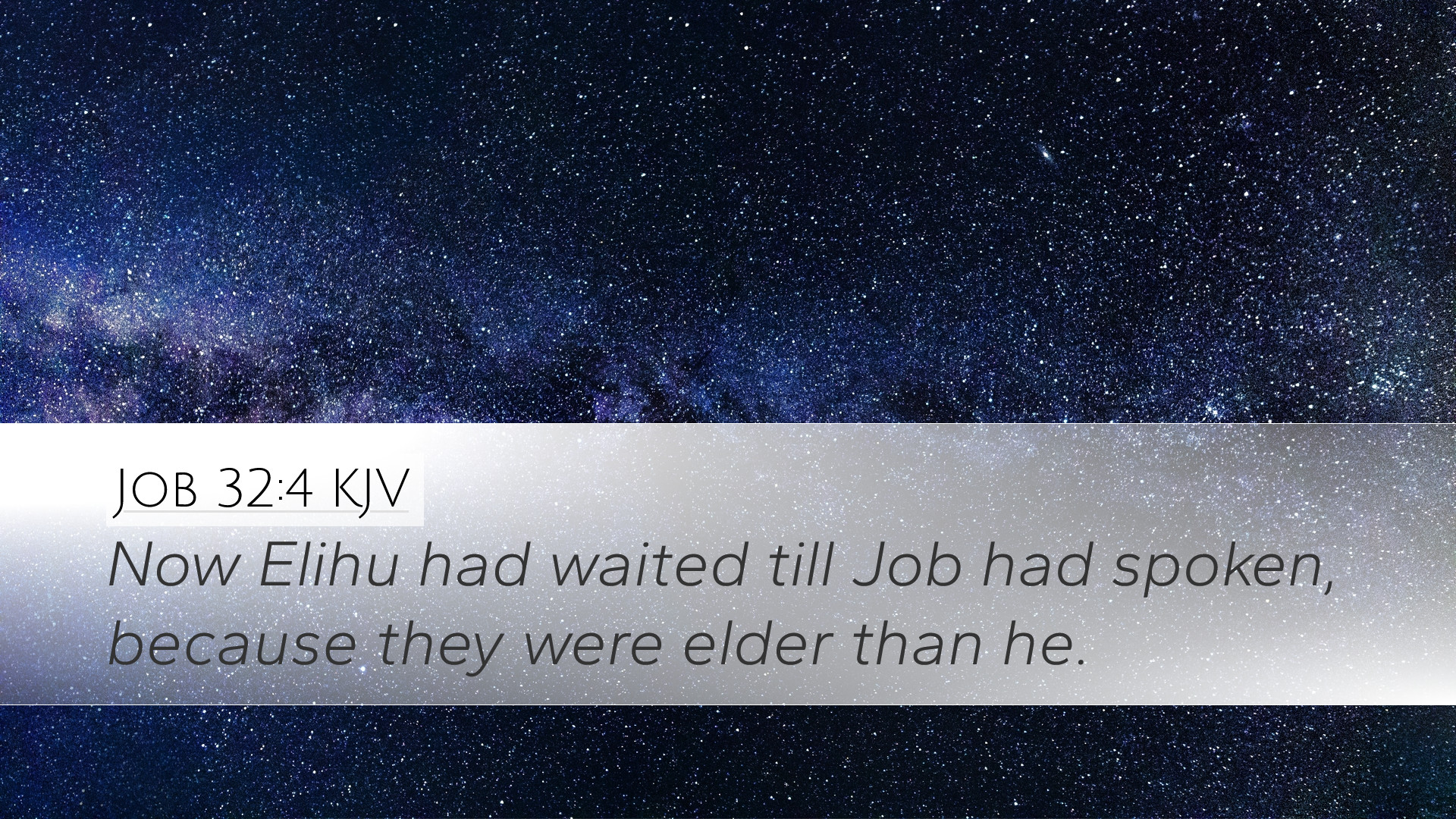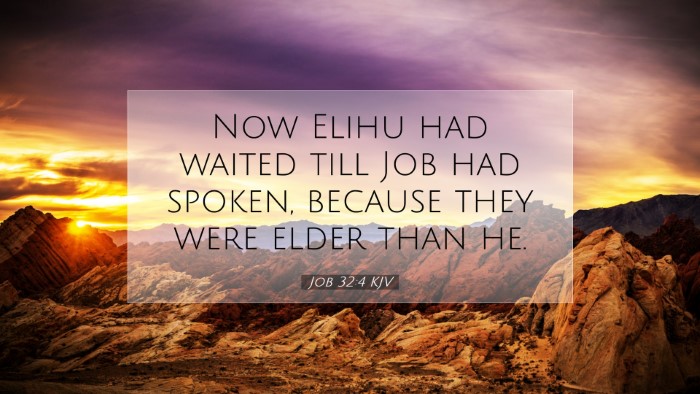Old Testament
Genesis Exodus Leviticus Numbers Deuteronomy Joshua Judges Ruth 1 Samuel 2 Samuel 1 Kings 2 Kings 1 Chronicles 2 Chronicles Ezra Nehemiah Esther Job Psalms Proverbs Ecclesiastes Song of Solomon Isaiah Jeremiah Lamentations Ezekiel Daniel Hosea Joel Amos Obadiah Jonah Micah Nahum Habakkuk Zephaniah Haggai Zechariah MalachiJob 32:4
Job 32:4 KJV
Now Elihu had waited till Job had spoken, because they were elder than he.
Job 32:4 Bible Commentary
Commentary on Job 32:4
Job 32:4 states, "Now Elihu had waited till Job had spoken, because they were elder than he." This verse introduces Elihu, a young man who has been silent during the dialogues between Job and his three friends. As we delve into various public domain commentaries, we gain deeper insights into the implications and significance of this passage.
Contextual Background
Before interpreting Elihu's statement, it's essential to examine the broader context of the Book of Job. The narrative unfolds as a divine exploration of suffering, righteousness, and the justice of God. Job, a righteous man, finds himself enduring profound physical and emotional suffering, prompting discussions with his three friends, who argue about the nature of sin and suffering. This unique dynamic sets the stage for Elihu's entrance and his subsequent speeches.
Insights from Matthew Henry
According to Matthew Henry, Elihu’s waiting reflects not merely respect for his elders but also a profound understanding of the situation. Henry notes that Elihu, despite his youth, possessed the courage to speak the truth when he perceived a need for it:
- Wisdom in Delay: Henry emphasizes that Elihu's patience in waiting to speak demonstrates wisdom. He recognized the authority of the elder speakers but was also aware that their arguments had not met the truth.
- Preparation for Speech: This waiting period allowed Elihu to formulate his thoughts, ensuring that when he finally spoke, he could do so with clarity and conviction. Henry sees this as a strong characteristic of discernment.
Insights from Albert Barnes
Albert Barnes expands upon the idea of age and authority. In his commentary, he notes the cultural significance of respected elders:
- Cultural Dynamics: Barnes discusses how, in ancient Near Eastern societies, the wisdom of the elderly was highly esteemed. Elihu's deference to those older than him illustrates the societal norms of respect.
- Challenge to Conventional Wisdom: Despite honoring this tradition, Elihu’s eventual speaking out signifies a challenge to the perceived wisdom of Job's friends, showing that true understanding is not solely dependent on age.
- Divine Inspiration: Barnes suggests that Elihu's delay was not merely a sign of respect but perhaps divinely influenced, allowing him to be the conduit through which God’s response to Job’s suffering would ultimately come.
Insights from Adam Clarke
Adam Clarke offers a theological reflection on Elihu’s role within the larger narrative of suffering:
- Youth and Authority: Clarke points out that, although Elihu is younger, his observations are astute and relevant. He argues that youth can hold important truths that sometimes evade the older generation, particularly when hearts grow hardened or biased through experience.
- Divine Perspective: Clarke highlights that Elihu’s speeches serve as a prelude to God’s own voice in the narrative. Elihu functions as a bridge, setting the stage for the divine revelation that will follow. His perspective is crucial as it aligns closely with God’s ultimate message to Job.
Theological Implications
This verse and its interpretation raise significant theological questions about authority, wisdom, and divine communication:
- Authority and Truth: The dynamics between Elihu and the older men elucidate a profound truth within leadership—true wisdom is not exclusive to age or experience. God’s truth can often emerge from unexpected places.
- Humility and Openness: Elihu's example encourages humility among those who teach and preach. Recognizing that younger voices may carry divine insight fosters an environment of openness in learning.
- The Role of Suffering: Elihu's entry into the conversation underscores a transformational aspect of suffering—it not only challenges existing paradigms but also opens avenues for God’s voice, calling for individuals to reevaluate their understanding of justice and righteousness.
Conclusion
In conclusion, Job 32:4 serves as a pivotal moment in the dialogue of the book, encapsulating themes of respect, authority, and the quest for truth. Elihu's waiting, rooted in humility and discernment, offers profound lessons for pastors, students, theologians, and scholars alike. His eventual contributions lay the groundwork for a deeper engagement with divine wisdom, inviting all readers to consider the complexities of human suffering and God’s ultimate purpose therein.


